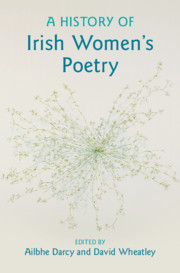Book contents
- A History of Irish Women’s Poetry
- A History of Irish Women’s Poetry
- Copyright page
- Contents
- Notes on Contributors
- Acknowledgements
- Introduction I
- Introduction II
- Chapter 1 Women in the Medieval Poetry Business
- Chapter 2 Seventeenth-Century Women’s Poetry in Ireland
- Chapter 3 The Oral Tradition
- Chapter 4 Archipelagic Ireland
- Chapter 5 Irish Romanticism
- Chapter 6 Mary Tighe in Life, Myth, and Literary Vicissitude
- Chapter 7 Masculinity, Nationhood, and the Irish Woman Poet, 1860–1922
- Chapter 8 The Eclipse of Dora Sigerson
- Chapter 9 Between Revivalist Lyric and Irish Modernism
- Chapter 10 The Other ‘Northern Renaissance’
- Chapter 11 Rematriating Mid-Century Modernism
- Chapter 12 Accidental Irishness and the Transnational Legacy of Lola Ridge
- Chapter 13 Crisis and Renewal: Irish-Language Poetry in the Twentieth and Twenty-First Centuries
- Chapter 14 The Poetry of Máire Mhac an tSaoi and the Indivisibility of Love
- Chapter 15 Biddy Jenkinson
- Chapter 16 Bilingual Poetry
- Chapter 17 Catholicism in Modern Irish Women’s Poetry
- Chapter 18 1970s–80s Feminism
- Chapter 19 The Art of Fabrication
- Chapter 20 Eavan Boland, History and Silence
- Chapter 21 Paula Meehan and the Public Poem
- Chapter 22 Formalism and Contemporary Women’s Poetry
- Chapter 23 ‘A Song Said Otherwise’
- Chapter 24 Contemporary Irish Women’s Poetry, beyond the Now
- Select Bibliography
- Index
Chapter 6 - Mary Tighe in Life, Myth, and Literary Vicissitude
Published online by Cambridge University Press: 11 June 2021
- A History of Irish Women’s Poetry
- A History of Irish Women’s Poetry
- Copyright page
- Contents
- Notes on Contributors
- Acknowledgements
- Introduction I
- Introduction II
- Chapter 1 Women in the Medieval Poetry Business
- Chapter 2 Seventeenth-Century Women’s Poetry in Ireland
- Chapter 3 The Oral Tradition
- Chapter 4 Archipelagic Ireland
- Chapter 5 Irish Romanticism
- Chapter 6 Mary Tighe in Life, Myth, and Literary Vicissitude
- Chapter 7 Masculinity, Nationhood, and the Irish Woman Poet, 1860–1922
- Chapter 8 The Eclipse of Dora Sigerson
- Chapter 9 Between Revivalist Lyric and Irish Modernism
- Chapter 10 The Other ‘Northern Renaissance’
- Chapter 11 Rematriating Mid-Century Modernism
- Chapter 12 Accidental Irishness and the Transnational Legacy of Lola Ridge
- Chapter 13 Crisis and Renewal: Irish-Language Poetry in the Twentieth and Twenty-First Centuries
- Chapter 14 The Poetry of Máire Mhac an tSaoi and the Indivisibility of Love
- Chapter 15 Biddy Jenkinson
- Chapter 16 Bilingual Poetry
- Chapter 17 Catholicism in Modern Irish Women’s Poetry
- Chapter 18 1970s–80s Feminism
- Chapter 19 The Art of Fabrication
- Chapter 20 Eavan Boland, History and Silence
- Chapter 21 Paula Meehan and the Public Poem
- Chapter 22 Formalism and Contemporary Women’s Poetry
- Chapter 23 ‘A Song Said Otherwise’
- Chapter 24 Contemporary Irish Women’s Poetry, beyond the Now
- Select Bibliography
- Index
Summary
Mary Tighe’s long Spenserian allegorical romance, Psyche (1805), is one of the major poems by an Irish woman of the early nineteenth century. Shaped by the zealous Methodism of her childhood, Tighe reacted with anguish to the political violence of 1798, offering the reconciling balms of sentiment to the open wounds of sectarian conflict. In Psyche, a mother and a young woman vie for the affections of a son, displacing national struggle into a realm of emotional psychodrama. Connecting with nature, a rejected woman rediscovers the force of attachment and belonging, even as the text accommodates (via Apuleius) a good deal of sexual errancy and threats to feminine decorum. In its drama of female audacity, transgression and outcast heroism, the poem shows Miltonic ambitions, seeding a template much emulated by Tighe’s fellow poets of the nineteenth century and beyond.
- Type
- Chapter
- Information
- A History of Irish Women's Poetry , pp. 127 - 141Publisher: Cambridge University PressPrint publication year: 2021
- 11
- Cited by

